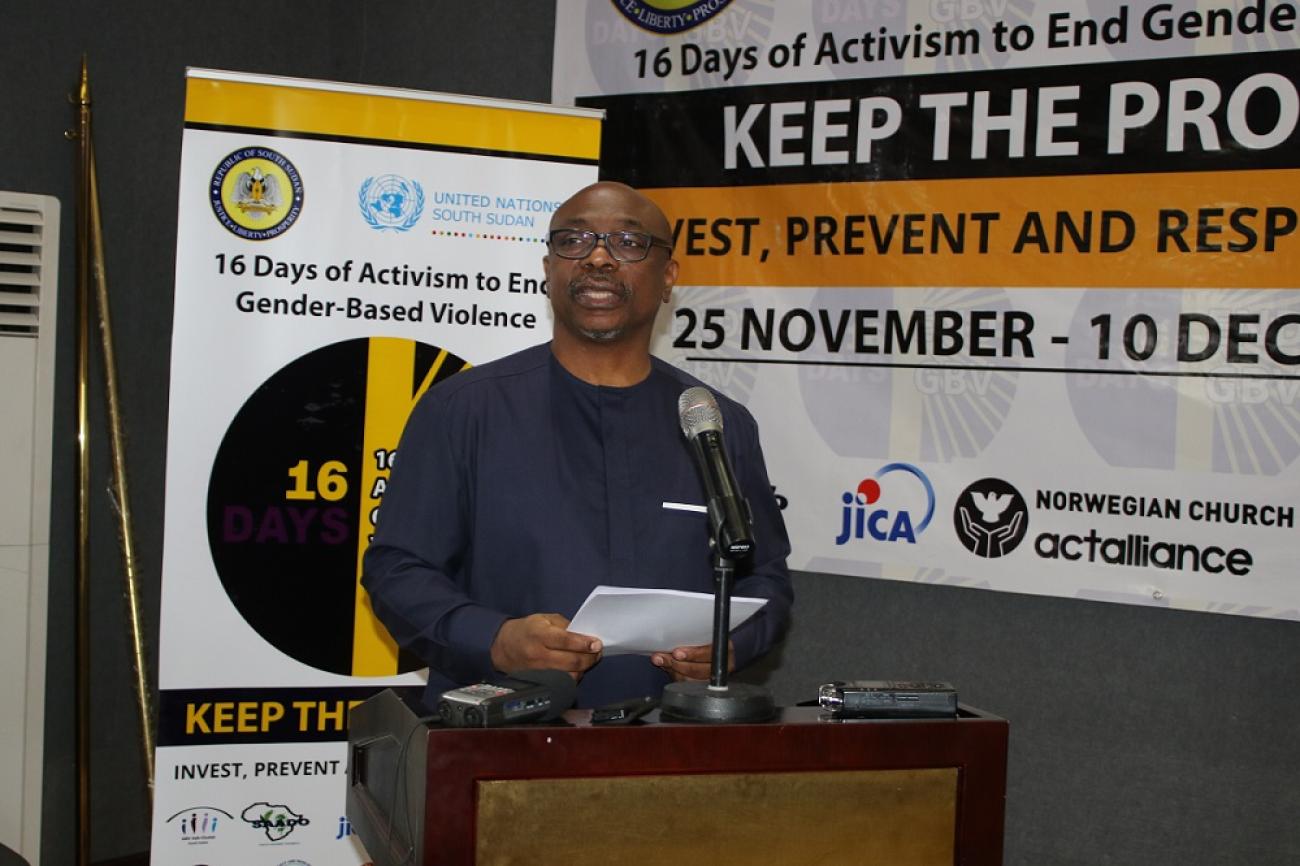High-level dialogue on GBV kicks off 16 Days of Activism campaign

Gender based-violence is not only manifested in the physical and sexual violence, but also through overall lack of equal opportunities for women and girls
The United Nations in South Sudan pushed for the enactment of the Anti-GBV Bill as it maintained that eliminating gender-based violence will require a robust legal framework that protects GBV survivors.
Speaking at the High-Level Dialogue on GBV, which launched this year’s 16 Days of Activism Against Gender-Based Violence, Mr. Alain Noudehou, Deputy SRSG and UN Resident Coordinator and Humanitarian Coordinator, called on all stakeholders to keep up the Constitutional promise to the women and girls of South Sudan to enact laws to combat harmful customs and traditions which undermine the dignity and status of women.
The Anti-GBV Bill, which was drafted last year, is expected to be tabled for deliberations when the new Parliament convenes.
Mr. Noudehou also underscored the importance of involving and educating men, boys and the young generation about their responsibility in eliminating gender-based violence.
“If we want gender-based violence to end, we must focus on educating our next generation on gender equality, eliminate the socio-cultural practices and beliefs that perpetuate violence against women and begin to recognize the greater role of women in peace and nation building,” he said.
UNFPA Country Representative Dr. Mary Otieno also emphasized the importance of addressing gender inequality and harmful social norms, which are at the root of the problem on GBV.
“We must also look at the status of women and the girl-child, address poverty, as well as end impunity for GBV and the conflict that exacerbates violence against women and girls,” she said.
The Ministry of Gender, Child and Social Welfare and the UN jointly held the high-level national dialogue at the launch of the 16 Days campaign under the national theme “Keep the promise: Invest, prevent and respond to GBV.”
The national dialogue aims to bring to the fore the magnitude of gender-based violence in the country and highlight the need to step up support, including funding, for GBV prevention and response programmes. The dialogue brought together government officials led by Vice President Rebecca Garang de Mabior, who gave a remarkable message about ending GBV in South Sudan. Chief Justice Chan Reec Madut also made strong commitments about reforms in the justice system for GBV survivors, including establishing more mobile courts and the launching of the fast-track court for GBV and juvenile cases in Juba during the 16 days campaign.
Development partners, UN agencies, and the civil society also joined the launch of the campaign at the venue and online to give their perspective on the GBV situation and find ways to step up collaboration in the fight against GBV. The Minister of Gender, Child and Social Welfare Aya Benjamin Warile is providing overall leadership for the campaign, along with UNFPA which is leading the GBV sub-cluster.
According to the Gender Based Violence Information Management System (GBV IMS), more than 6,000 cases of GBV have been reported from January to September this year. The cases include physical violence, emotional violence, and sexual violence. Government data also shows that child marriage, another form of GBV, remains a prevalent practice in the country where 40 per cent of girls under 18 are already married.
The Ministry of Gender, Child and Social Welfare is working with the GBV sub-cluster led by UNFPA, the United Nations Population Fund, in conducting a series of activities during the 16 days campaign to focus the spotlight on multi-sectoral initiatives to end GBV.
Gender based-violence is not only manifested in the physical and sexual violence, but also through overall lack of equal opportunities for women and girls to lead a fulfilling life. High rate of illiteracy amongst girls and women, high rate of child marriage, high maternal mortality due to preventable causes, and limited access to livelihood opportunities are some of the indicators that highlight the dire need to address the gender inequality at the root causes to end gender-based violence.
The 16 days campaign will culminate on 10 December, Human Rights Day, with a national dialogue on child marriage with traditional leaders. This is a follow-up meeting from the 2019 Paramount Chiefs Conference on GBV where 33 chiefs from across the country adopted a national declaration to achieve zero gender-based violence in South Sudan.
Other activities during the 16 days campaign will focus on multiple exclusions suffered by HIV positive GBV survivors, a forum on the role of health and social workers in providing survivor-centered services to GBV survivors, and discussions on GBV against persons with disabilities and their right to services.


